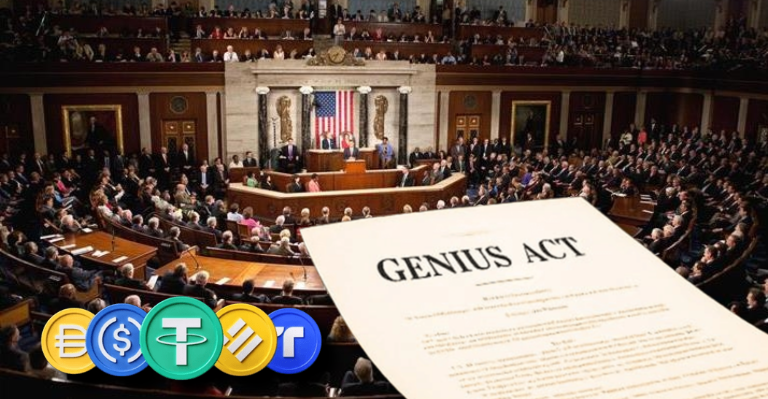TL;DR
- The Senate has passed the GENIUS Act, creating the first formal regulatory framework for stablecoins in the U.S., allowing banks and tech companies to issue these digital assets under strict rules.
- The legislation demands stablecoins be fully backed by liquid assets and introduces monthly transparency requirements.
- This step aims to integrate stablecoins more firmly into the traditional financial system, encouraging innovation while addressing consumer protections.
The recent Senate vote on the GENIUS Act marks a pivotal moment for the digital asset sector by setting clear rules for regulated stablecoins. This legislation is expected to open the doors for banks, Wall Street firms, and major technology companies to issue stablecoins, which are cryptocurrencies pegged to stable assets like the U.S. dollar or Treasury securities. By formalizing these standards, the Act reduces uncertainty that has long hindered widespread adoption of stablecoins in financial markets, providing much-needed regulatory clarity to investors and issuers alike.
The GENIUS Act mandates that stablecoin issuers maintain sufficient reserves and meet stringent bankruptcy protections for users. Additionally, monthly disclosures on reserve compositions aim to boost transparency and trust. Industry leaders see this as a crucial move that could unlock trillions of dollars in liquidity and fuel innovation in payments and decentralized finance.
Financial Sector Reactions And Future Challenges Ahead
Despite enthusiasm from the crypto industry, some traditional financial institutions remain cautious, viewing stablecoins as potential competition to their deposit bases. This dynamic may explain recent moves like JPMorgan’s launch of JPMD, a deposit token on a public blockchain, coinciding with the Senate’s approval.
Moreover, the bill’s path to becoming law still faces challenges. The House of Representatives is considering a separate stablecoin bill with differences that could delay final approval. Additionally, efforts to combine stablecoin legislation with broader market infrastructure reforms might complicate progress.

Nonetheless, market players like Circle have already experienced a surge in valuation following the Senate’s vote, signaling confidence in a more regulated digital asset future. Major companies such as Amazon, Walmart, Apple, and Google reportedly explore stablecoin issuance or adoption, underlining stablecoins’ growing relevance in everyday commerce.
With stablecoins representing a large share of digital dollar-denominated assets, the GENIUS Act aims to reinforce the U.S. dollar’s dominant role in the evolving digital economy while fostering innovation through regulation. The legislation is a foundational step toward a more integrated and transparent financial ecosystem that embraces blockchain technology, bridging the gap between traditional finance and decentralized solutions. This advancement could accelerate mainstream adoption of digital payments and enhance global competitiveness for U.S. financial institutions.

